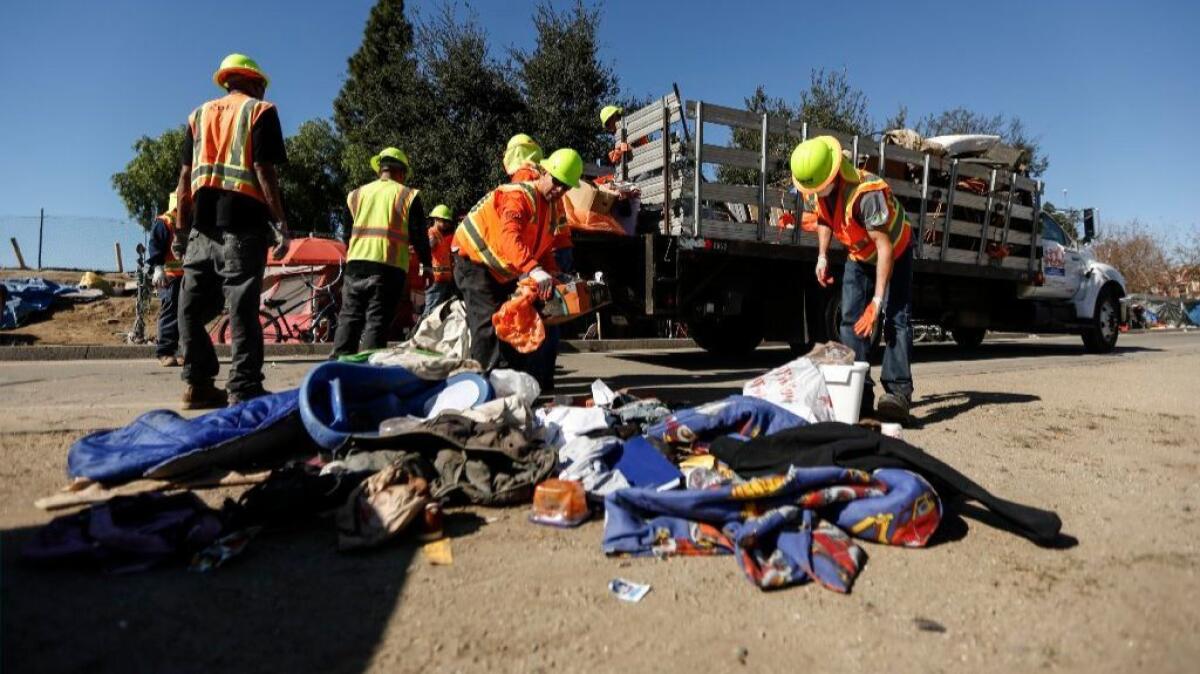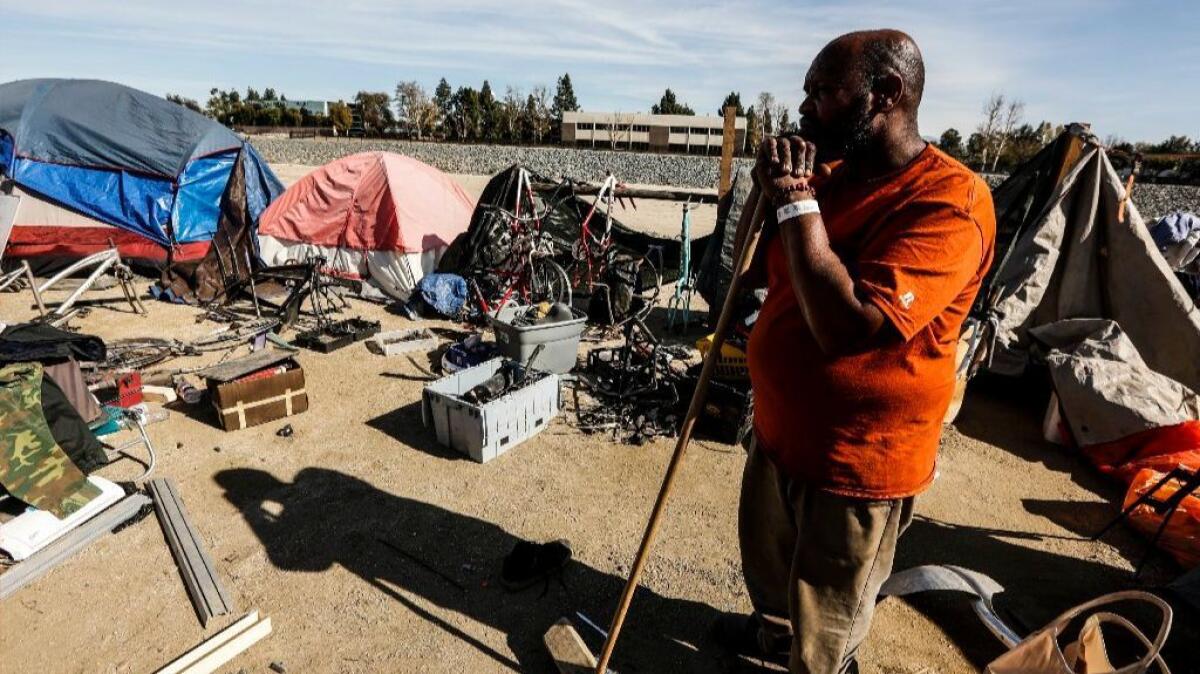Hundreds of homeless face eviction or arrest as O.C. clears encampment amid shelter bed shortage

- Share via
Ray Huey bounced around from North Carolina to Washington state, Oregon, Idaho and Nevada before landing at the homeless camp on the side of the Santa Ana River in Anaheim.
In Anaheim, he found an unlikely collection of homeless people, including many couples. For years, this growing camp has become not just a place to sleep but a community for hundreds, complete with makeshift dwellings and a scattering of dogs.
But on Monday, Orange County officials began clearing out the camp, the final stage in a months-long effort to remove camps along the river that had become a much-debated symbol of the affluent county’s spiraling homeless problem.
“I just love this country, so it’s hard to pick one place to stay,” Huey said. “I guess I have to respect what they’re doing — but no, I haven’t made up my mind where to go next.”
And that is the central problem facing river-dwelling and thousands of other homeless people in Orange County. While housing prices and rents are skyrocketing, the county has a chronic shortage of beds for those with nowhere else to live.
The river camps had become a stopgap measure, and officials acknowledge they don’t know where many of those being evicted will end up.
For every two homeless people in the county, there is just one shelter program space for them to go, according to an estimate from Eve Garrow of the American Civil Liberties Union.
An estimated 4,800 homeless people are in the county. Officials have responded to the rising homeless population by adding 525 beds in the last year or so, with 100 more coming in 2018. But that’s far from keeping up with demand.
Of Orange County’s 34 cities, 33 have ordinances that make it a crime to sleep or rest in public places, according to a report from the ACLU. Homeless advocates say it’s these laws that are part of the reason why so many people have been forced to descend on the riverbed in the first place.
“There’s nowhere in Orange County where it’s legal to be homeless,” said Mohammed Aly of the Orange County Poverty Alleviation Coalition.

Many expect some of those who leave the camps will end up in other public spaces. Anaheim officials said they will try to be welcoming but noted the city does not allow overnight camping.
“We’re prepared to see people come to different spots around our city. Anyone’s welcomed to our parks, our libraries and around town … but we will couple outreach services with enforcement,” said Mike Lyster, a city spokesman.
Starting this week, Lyster said officials added extra security to city parks as backup for rangers and police, while a homeless outreach team, staffed with police officers, trained to work with homeless people. He said the hope is that homeless people will take advantage of those services available to them.
“We know it’s important to keep in touch with this population as it can take 12 to 15 times of talking to people before things will click — and before they will start accepting services,” Lyster said.
Anaheim has been struggling with an influx of homeless people. Last year, it generated national headlines by agreeing to remove some bus benches after complaints from merchants about homeless people sleeping on them.
Day One of the county’s mass homeless project started out as a soft sell.

Early Monday morning, workers from the county’s Health Care Agency and the Sheriff’s Department strolled up and down the dusty path, quietly observing as residents awoke to a constant stream of visitors from social services groups and the media.
“We’re looking for progress. We’re asking for volunteers. But there will be a time when people will have to leave — and if they don’t leave — they will be subject to arrests,” said Orange County Undersheriff Don Barnes.
The cleanup was prompted by complaints from nearby residents about filth and crime. Since September, Barnes said authorities have arrested more than 500 people along the riverbed for a range of violations.
Orange County Supervisor Todd Spitzer called Monday “a day of reckoning” for the homeless population.
“They must go elsewhere because citizens who live near the river trail area also have every right to be respected. They must be able to feel safe … and this is not the right place to set up to stay,” he said.
But Kenneth Batiste, who heads the Orange County chapter of the Housing Is a Human Right nonprofit organization, said removing the homeless without a place for them to go does not solve the problem.
“We just want people to have a fair chance,” Batiste added. “I’ve been here when officials try to intimidate these folks by issuing citations, but we need to understand that people are not trash. They deserve care, and they need our compassion.”
On Monday along the riverbed, a tiny terrier named Dolly tried to guard the blue tent belonging to her “mother,” Jodi Samhat, 34.
The pair cling to each other as Samhat said she is unsure where to go next, noting shelters are out of the question because they don’t accept dogs.
Two weeks ago, county workers began visiting the encampment to alert people that they would need to move starting Monday.
Since then, “I’ve cried. I’ve thought and thought and tried to make plans, but nothing could work. Where do you end up when every door is shut?” Samhat asked.
Her friend Laura Kasten, 50, faces the same dilemma. Officials offered pet owners such as herself and her husband, John Kasten, temporary boarding for their dogs. But they refused to turn over Sebastian, a wire-haired terrier and dachshund mix.
“We both have separation anxiety,” said Laura Kasten, who grew up in Fullerton. “He means the world to us, and we will take care of him. It’s clear no one wants us to be able to stay at the riverbed. They’re very prejudiced. The way they talk to us and tell us to get out, it’s like we’re dirt.”
One place some of the homeless evicted from the river will probably go is the Santa Ana Civic Center, which has been another gathering spot for those without shelter.
“Some of them will be coming here, for sure,” said Bill Wilson, a homeless man who lives in the Civic Center Plaza. “It’s not like there are a lot of choices. You just make do, because that’s all we can do.”
More to Read
Sign up for Essential California
The most important California stories and recommendations in your inbox every morning.
You may occasionally receive promotional content from the Los Angeles Times.












